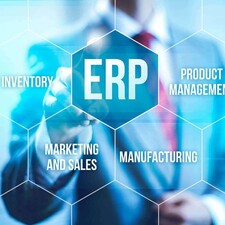Blog
4 Benefits of ERP System If You've Never Had ERP

Summary
What are the big benefits for organizations implementing an ERP system for the first time? We’re all familiar with the growing pains of maturing businesses. As companies grow, numerous systems and silos emerge. You hire people, you organize them into departments, you set up systems and standardize processes to support them and your customers. Then one day you realize that your finance function can’t see what your sales function is doing in realtime, nor can your production team track what’s coming in (or going out of) your warehouse. Coordination lags, and you need to step into the breach.
One day, you realize: “Houston, we have a problem” with our systems. Each department and function has its own system and its own “source of truth,” which creates confusion and ultimately impacts your productivity and customer orientation. You may hear your customers commenting that “your left hand doesn’t know what your right hand is doing.” Well, that’s the time for a fundamental change.
An ERP System to the Rescue
An Enterprise Resource Planning, or ERP system, integrates all departments and functions across your company onto a single system that can serve all those different departments’ particular needs. It’s a coordination tool that allows you to scale up and remain agile into the future.
ERP integrates all departments and functions across your company onto a single system that can serve all those different departments’ particular needs
Finance, manufacturing and the warehouse still have their own software systems, only now those systems are linked together so that someone in finance or customer service can instantly access the warehouse system to see if an order has been shipped and paid for. Employees in manufacturing can check the warehouse’s system to see if necessary components have been delivered or not.
You can plan, and everyone in your company has the data they need to coordinate activities to better serve your customers and your strategic goals.
For companies, in no matter what industry, ERP systems offer a number of massive benefits. Let’s examine the biggest four:
#1 The transparency/visibility you gain into what’s happening across your organization
With an ERP system, your leadership team will no longer be spending its limited time figuring out what’s happening by accessing and analyzing data from multiple, non-integrated systems. Instead, an ERP system gives you a real-time snapshot of what’s happening across your organization. You can view your company’s KPIs (key performance indicators) via a dashboard. To say that this visibility supports coordination among departments and better decision making would be an understatement. You’ll work better internally, which means you’ll deliver the promises you make to your customers
#2 One version of truth eliminates redundant/manual efforts
An ERP system eliminates the need for redundant manual entry of data within each system/silo, prevents errors caused by such redundancies, and allows your people to “be on the same page” as you manage the business. You can’t be customer centric if your people are constantly asking customers for the same data. With an ERP system (through a CRM, for example), all customer relationship data is entered once in a single system, and becomes accessible by all your people on whatever device they're using, from inside or outside the facility. A single source of truth is also foundational for any effective digital transformation you may want to drive within your company.
#3 Optimization and standardization of processes
You can standardize processes and become more efficient across your entire company. So instead of HR or marketing paying its vendors in different ways, your company pays vendors the same way, allowing finance to easier track (and manage) your company’s spend and making negotiations with vendors more straightforward. The ability to standardize via an ERP system is especially important if you grow through acquiring other companies, who can be more easily integrated into your way of doing things via your ERP system.
#4 Agility for today and tomorrow
A good ERP system is agile enough to future-proof your company. With a flexible ERP system, you can add modules (such as HR, Finance, etc.) as you go, and your trusted, expert ERP partner will continually update your system to take advantage of emerging technologies. You can buy only the modules you need today, but can add modules later on as you grow. Moreover, you won’t need a huge, hard-to-hire IT team to build and implement new systems as you grow. Unlike your ossifying, non-integrated legacy IT systems, an ERP system is integrated, scalable, and supports your future growth. Instead of spending all your time fixing up your aging legacy IT systems, an ERP system provides you with a scalable platform to grow, enabling you to easily integrate new technologies (like IoT) as they emerge today and tomorrow.
The abas ERP Difference
You’ll want to implement your ERP system the right way, which means working with a partner who will work hard to understand your needs and deliver customized solutions that support you today and tomorrow. For companies new to ERP, you won’t find a better partner than abas ERP. In brief, here’s why abas ERP provides all the obvious benefits listed above, and more:
- abas ERP is future focused. The software helps customers adapt to whatever changes come down the pipeline and take full advantage of emerging opportunities in manufacturing, such as cloud ERP, the Internet of Things (IoT), digitization, data analytics, multi-site growth, globalization, and mobile ERP.
- abas builds ERP software specifically for mid-sized businesses in industrial machinery manufacturing, electronics, automotive, custom manufacturing and fabrication & assembly. We have experts with vast real-world experience in those industries who’ll help you improve your processes, not just implement ERP.
- abas offers a variety of deployment options including Cloud ERP, On-Premise and Hybrid ERP solutions. We help you figure out what works best for meeting your needs.
- abas ERP has a modern, intuitive User Interface. Users can interact with the system in multiple ways, including mobile apps, web browsers, the Windows client, and even barcode scanners.
- Our software offers easy customizations and upgrades so your ERP system can work well with all your production and business processes.
If you’re ready to move away from the confusion and inefficiency of proliferating systems and legacy silos that hold back your growth, then it’s time for implementing an ERP system
Want to know more about selecting your first ERP? Download our new whitepaper, Selecting an ERP System in 7 Easy Steps


